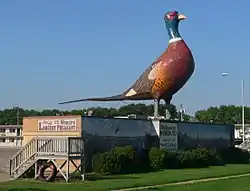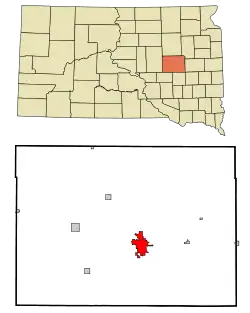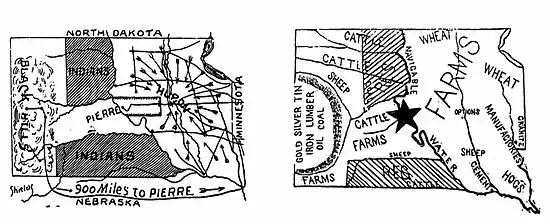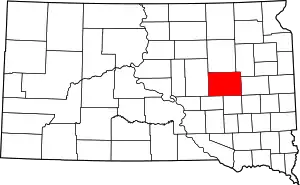Huron, South Dakota
Huron is a city in Beadle County, South Dakota, United States. It is the county seat of Beadle County.[6] The population was 14,263 at the 2020 census,[7] and it is the 8th most populous city in South Dakota.
Huron, South Dakota | |
|---|---|
 World's Largest Pheasant in Huron | |
 Location in Beadle County and the state of South Dakota | |
 Huron, South Dakota Location in the United States | |
| Coordinates: 44°21′33″N 98°13′5″W | |
| Country | United States |
| State | South Dakota |
| County | Beadle |
| Incorporated | 1883[1] |
| Named for | Huron Indians[1] |
| Government | |
| • Type | Commissioner Form |
| • Mayor | Gary Harrington (D) |
| Area | |
| • Total | 10.81 sq mi (27.99 km2) |
| • Land | 9.72 sq mi (25.17 km2) |
| • Water | 1.09 sq mi (2.82 km2) |
| Elevation | 1,280 ft (390 m) |
| Population | |
| • Total | 14,263 |
| • Density | 1,467.54/sq mi (566.64/km2) |
| Time zone | UTC−6 (CST) |
| • Summer (DST) | UTC−5 (CDT) |
| ZIP code | 57350 and 57399 |
| Area code | 605 |
| FIPS code | 46-31060[4] |
| GNIS feature ID | 1255722[5] |
| Airport code | HON |
| Website | huronsd.com |
The first settlement at Huron was made in 1880.[8] Huron is location of the South Dakota State Fair, and of a statue called the World's Largest Pheasant.[9]
History

Huron was founded during railroad and land booms in the 1880s. The early history of the town is closely linked with the Chicago and Northwestern Railway. At the direction of Marvin Hughitt, general manager of the railroad, the west bank of the James River was selected as the railway's division headquarters. The company gained title to 880 acres (3.6 km2) of land at that location. Huron was named for the Huron Indians.[10]
The original plat covered 11 blocks, and Huron's first settler was John Cain, a practical printer from Troy, New York. He learned in Chicago, from the railroad people, that they would have their chief town and operating headquarters at their James River crossing.
Beginning in 1880, Huron and Pierre vied to be selected as the state capital, until Pierre was chosen in 1904. Campbell Park and Winter Park in Huron were previously designated as properties for the capital grounds, and a city block of land between the parks with Victorian houses was originally slated for the capitol building.
- Chronology:
- 1879 – The town site was located
- 1880 – Town site surveyed and platted
- 1881 – First town government formed - a board of four trustees, a town clerk, a justice of the peace, one marshal and a surveyor
- 1882 – Alderman system of government adopted
- 1883 – Incorporated as the City of Huron - the city still operates under the original charter and seal
- 1910 – Changed from alderman to city commission form of government
- 1935 – City manager form of government adopted
Geography
According to the United States Census Bureau, the city has a total area of 10.57 square miles (27.38 km2), of which 9.48 square miles (24.55 km2) is land and 1.09 square miles (2.82 km2) is water.[11]
Climate
Huron has a humid continental climate, with hot, humid summers, cold, dry winters, and wide temperature extremes; it is part of USDA hardiness zone 4b.[12] The normal monthly mean temperature ranges from 16.0 °F (−8.9 °C) in January to 73.7 °F (23.2 °C) in July.[13] On average, there are 1.7 days that reach 100 °F (38 °C) or higher, 21.9 days that reach 90 °F (32 °C) or higher, 66.7 days that do not climb above freezing, 27.7 days with a low of 0 °F (−18 °C) or below, and 3.1 days that do not rise above 0 °F (−18 °C) annually.[13][14] The average window for freezing temperatures are September 30 through May 5,[13] allowing a growing season of 147 days. Extreme temperatures officially range from −43 °F (−42 °C) on January 12, 1912, and January 8, 1887, up to 112 °F (44 °C) on July 10, 1966; the record cold daily maximum is −21 °F (−29 °C) on January 14, 1888, while, conversely, the record warm daily minimum is 82 °F (28 °C) on July 11, 1936.[13]
Precipitation is greatest in May and June and averages 23.32 in (592 mm) annually, but has ranged from 9.72 in (247 mm) in 1952 to 30.89 in (785 mm) in 2010.[13] Snowfall averages 44.4 in (113 cm) per season, and has historically ranged from 10.1 in (26 cm) in 1930–31 to 89.6 in (228 cm) in 2000–01;[13] the average window for measurable (≥0.1 in or 0.25 cm) snowfall is November 3 through April 11, although snow in October occurs several times per decade and snow in May is a much rarer event.[13]
| Climate data for Huron Regional Airport, South Dakota, 1991−2020 normals, extremes 1881−present[lower-alpha 1] | |||||||||||||
|---|---|---|---|---|---|---|---|---|---|---|---|---|---|
| Month | Jan | Feb | Mar | Apr | May | Jun | Jul | Aug | Sep | Oct | Nov | Dec | Year |
| Record high °F (°C) | 65 (18) |
71 (22) |
89 (32) |
97 (36) |
106 (41) |
109 (43) |
112 (44) |
110 (43) |
106 (41) |
102 (39) |
86 (30) |
71 (22) |
112 (44) |
| Average high °F (°C) | 25.8 (−3.4) |
30.8 (−0.7) |
43.7 (6.5) |
57.9 (14.4) |
70.0 (21.1) |
80.0 (26.7) |
85.7 (29.8) |
83.4 (28.6) |
75.7 (24.3) |
60.2 (15.7) |
43.9 (6.6) |
30.2 (−1.0) |
57.3 (14.1) |
| Daily mean °F (°C) | 16.0 (−8.9) |
20.5 (−6.4) |
32.9 (0.5) |
45.7 (7.6) |
57.9 (14.4) |
68.3 (20.2) |
73.7 (23.2) |
71.3 (21.8) |
62.6 (17.0) |
47.9 (8.8) |
33.1 (0.6) |
20.6 (−6.3) |
45.9 (7.7) |
| Average low °F (°C) | 6.2 (−14.3) |
10.2 (−12.1) |
22.1 (−5.5) |
33.6 (0.9) |
45.9 (7.7) |
56.7 (13.7) |
61.6 (16.4) |
59.2 (15.1) |
49.5 (9.7) |
35.5 (1.9) |
22.2 (−5.4) |
11.0 (−11.7) |
34.5 (1.4) |
| Record low °F (°C) | −43 (−42) |
−41 (−41) |
−25 (−32) |
−2 (−19) |
16 (−9) |
31 (−1) |
37 (3) |
33 (1) |
18 (−8) |
−6 (−21) |
−28 (−33) |
−34 (−37) |
−43 (−42) |
| Average precipitation inches (mm) | 0.58 (15) |
0.75 (19) |
1.15 (29) |
2.52 (64) |
3.15 (80) |
3.89 (99) |
2.83 (72) |
2.59 (66) |
2.43 (62) |
1.95 (50) |
0.82 (21) |
0.66 (17) |
23.32 (592) |
| Average snowfall inches (cm) | 7.8 (20) |
8.9 (23) |
6.6 (17) |
5.5 (14) |
0.0 (0.0) |
0.0 (0.0) |
0.0 (0.0) |
0.0 (0.0) |
0.0 (0.0) |
1.4 (3.6) |
5.8 (15) |
8.4 (21) |
44.4 (113) |
| Average precipitation days (≥ 0.01 in) | 6.3 | 7.0 | 7.0 | 9.0 | 11.2 | 11.6 | 8.8 | 8.0 | 6.8 | 7.4 | 5.4 | 6.4 | 94.9 |
| Average snowy days (≥ 0.1 in) | 6.1 | 6.4 | 4.1 | 2.2 | 0.0 | 0.0 | 0.0 | 0.0 | 0.0 | 0.9 | 3.3 | 6.0 | 29.0 |
| Average relative humidity (%) | 71.2 | 73.7 | 73.3 | 66.3 | 66.3 | 68.3 | 65.8 | 66.6 | 67.7 | 66.8 | 72.8 | 74.0 | 69.4 |
| Mean monthly sunshine hours | 179.7 | 182.8 | 229.9 | 251.7 | 307.0 | 332.8 | 362.4 | 329.3 | 258.9 | 215.9 | 152.1 | 144.1 | 2,946.6 |
| Percent possible sunshine | 62 | 62 | 62 | 62 | 67 | 72 | 77 | 76 | 69 | 63 | 53 | 52 | 66 |
| Source: NOAA (relative humidity and sun 1961–1990)[13][14][16] | |||||||||||||
Demographics
| Census | Pop. | Note | %± |
|---|---|---|---|
| 1880 | 164 | — | |
| 1890 | 3,038 | 1,752.4% | |
| 1900 | 2,793 | −8.1% | |
| 1910 | 5,791 | 107.3% | |
| 1920 | 8,302 | 43.4% | |
| 1930 | 10,946 | 31.8% | |
| 1940 | 10,843 | −0.9% | |
| 1950 | 12,788 | 17.9% | |
| 1960 | 14,180 | 10.9% | |
| 1970 | 14,299 | 0.8% | |
| 1980 | 13,000 | −9.1% | |
| 1990 | 12,448 | −4.2% | |
| 2000 | 11,893 | −4.5% | |
| 2010 | 12,592 | 5.9% | |
| 2020 | 14,263 | 13.3% | |
| U.S. Decennial Census[17][3] | |||
2010 census
As of the census[18] of 2010, there were 12,592 people, 5,418 households, and 3,179 families residing in the city. The population density was 1,328.3 inhabitants per square mile (512.9/km2). There were 6,023 housing units at an average density of 635.3 per square mile (245.3/km2). The racial makeup of the city was 86.9% White, 1.0% African American, 1.2% Native American, 4.9% Asian, 0.1% Pacific Islander, 3.9% from other races, and 1.9% from two or more races. Hispanic or Latino of any race were 9.8% of the population.
There were 5,418 households, of which 28.7% had children under the age of 18 living with them, 44.4% were married couples living together, 9.8% had a female householder with no husband present, 4.4% had a male householder with no wife present, and 41.3% were non-families. 36.1% of all households were made up of individuals, and 15% had someone living alone who was 65 years of age or older. The average household size was 2.27 and the average family size was 2.94.
The median age in the city was 39.8 years. 24.1% of residents were under the age of 18; 8.7% were between the ages of 18 and 24; 22.8% were from 25 to 44; 26.4% were from 45 to 64; and 17.8% were 65 years of age or older. The gender makeup of the city was 49.4% male and 50.6% female.
2000 census
As of the census[4] of 2000, there were 11,893 people, 5,263 households, and 3,047 families residing in the city. The population density was 1,448.5 inhabitants per square mile (559.3/km2). There were 5,872 housing units at an average density of 715.2 per square mile (276.1/km2). The racial makeup of the city was 95.92% White, 0.96% African American, 1.29% Native American, 0.42% Asian, 0.03% Pacific Islander, 0.35% from other races, and 1.03% from two or more races. Hispanic or Latino of any race were 1.20% of the population.
There were 5,263 households, out of which 26.4% had children under the age of 18 living with them, 46.6% were married couples living together, 8.5% had a female householder with no husband present, and 42.1% were non-families. 37.3% of all households were made up of individuals, and 16.8% had someone living alone who was 65 years of age or older. The average household size was 2.18 and the average family size was 2.86.
As of 2000 the median income for a household in the city was $29,097. Males had a median income of $27,027 versus $19,921 for females. The per capita income for the city was $18,275.
Arts and culture
The operates a fine arts center and community theater.
In 2005, The Huron Event Center was opened, connecting an arena, hotel, and convention center.
The South Dakota State Fair is at the South Dakota State Fair Speedway.
Parks and recreation
The city operates a waterpark called Splash Central, featuring an Olympic-sized pool, slides, and children's area.
Government
The Huron government is "commissioner form". Under the commissioner form of government the board of commissioners consists of a mayor and four commissioners, who are all elected at large for three-year terms. The commission has control over all departments of the city and can make and enforce rules and regulations which it may see fit for the organization, management, and operation of the departments of the city. Responsibilities are divided into the following areas: Public Safety Commissioner, Public Works Commissioner, Utilities Commissioner, and Finance Commissioner with each commissioner having oversight in each respective area.
Huron has a federal building, field offices that is home to Social Security Administration, Western Area Power Administration, United States Fish and Wildlife Service, General Services Administration, Farm Service Agency and the USDA. Huron is also home to Area offices for state offices.
Education
The Huron School District has three public elementary schools, one middle school, and one high school. Huron High School's mascot is the "Tigers". 2022-2023 enrollment is approximately 2900 students.
It was the home of Si Tanka University (formerly Huron College) from 1983 to 2005.
Huron is also home to a Catholic elementary school called Holy Trinity School, and a private non-denomination K-12 School, James Valley Christian School.
Media
Newspaper
The Huron Daily Plainsman is the newspaper.
Television
KTTW operates a satellite station, operated by Tri-State Christian Television.
Radio
Radio stations include:
- 1210 AM - KOKK (country music)
- 1340 AM - KIJV (adult contemporary music)
- 88.7 FM - KVCH (Christian radio)
- 88.7 FM - K213CL (National Public Radio)
- 93.3 FM - KJRV (classic rock)
- 95.3 FM - K237EL (adult contemporary music)
Infrastructure
Transportation
U.S. Route 14 is an east–west route passing through the northern part of the city. It intersects with north–south South Dakota Highway 37 in the city. This was the historical designation of the north–south U.S. Route 281, which was later moved to a more direct route that passes about ten miles west of Huron.
The Rapid City, Pierre and Eastern Railroad runs east–west, with maintenance facilities and a working roundhouse in the city.
The Huron Regional Airport is city-owned. It had scheduled passenger flights operated by a commuter air carrier, Great Lakes Airlines, with Beechcraft 1900D commuter turboprop aircraft service to Denver. The airport does not currently see scheduled service.
People's Transit provides demand-response transit in and around Huron, and also provides a connection to Jefferson Lines intercity buses at Mitchell.
Notable people
- Adolphus W. Burtt, South Dakota Attorney General[19]
- Earl Caddock, professional wrestler.[20]
- J. L. Carr, English novelist, taught at the public school in Huron in 1938–1939 and 1956–1957.[21]
- Roxanne Conlin, Iowan politician, ran for senator in 2010.[22]
- Patrick Davis, Republican political consultant and former director of the National Republican Senatorial Committee.[23]
- John K. Fairbank, historian of China, was born in Huron in 1907.[24]
- Archibald K. Gardner, former federal judge[25]
- Bob Glanzer (1945-2020), member South Dakota House of Representatives 2017[26]
- Jennifer Jean Hart, one of the perpetrators of the Hart family murders[27]
- Candace Hilligoss, actress.[28]
- Muriel Humphrey, U.S. Senator from Minnesota in 1978 and wife of Hubert Humphrey.[29]
- Raymond A. Johnson, aviation pioneer.[30]
- Craig Kennedy, member of the South Dakota Senate[31]
- Cheryl Ladd, actress and singer.[32]
- Vernon C. Miller, Beadle County Sheriff turned Prohibition criminal.[33]
- Arthur L. Padrutt, Wisconsin politician.[34]
- John M. Patton, member of the Minnesota Senate and funeral director.[35]
- Gladys Pyle, first woman elected to the U.S. Senate without having previously been appointed.[36]
- John L. Pyle, Attorney General of South Dakota, 1899–1902.[37]
- Mamie Shields Pyle, women's suffrage advocate.[38]
- Mike Rounds, South Dakota governor and U.S. senator.[39]
- Chic Sale, actor and vaudevillian, born in Huron.[40]
- Ron Tschetter, Director of the Peace Corps.[41]
- Fred M. Wilcox, South Dakota state senator[42]
- Josh Haeder, 33rd State Treasurer of South Dakota.[43]
See also
- USS Huron, at least 2 ships
Notes
- Official records for Huron kept at downtown from July 1881 to 20 February 1939 and at Huron Regional Airport since 21 February 1939.[15]
References
- "History". City of Huron. Retrieved October 14, 2008.
- "ArcGIS REST Services Directory". United States Census Bureau. Retrieved October 15, 2022.
- "Census Population API". United States Census Bureau. Retrieved October 15, 2022.
- "U.S. Census website". United States Census Bureau. Retrieved January 31, 2008.
- "US Board on Geographic Names". United States Geological Survey. October 25, 2007. Retrieved January 31, 2008.
- "Find a County". National Association of Counties. Archived from the original on May 31, 2011. Retrieved June 7, 2011.
- "U.S. Census Bureau: Huron city, South Dakota". www.census.gov. United States Census Bureau. Retrieved February 4, 2022.
- Federal Writers' Project (1940). South Dakota place-names, v.1-3. University of South Dakota. p. 43.
- Brown, Greg; Jocelyn Sloan; Uther Draken (July 24, 2005). "Huron, South Dakota - World's Largest Pheasant". RoadsideAmerica.com. Retrieved October 19, 2007.
- History of the Origin of the Place Names in Nine Northwestern States. 1908. p. 11.
- "US Gazetteer files 2010". United States Census Bureau. Archived from the original on January 25, 2012. Retrieved June 21, 2012.
- "USDA Plant Hardiness Zone Map". United States Department of Agriculture. Archived from the original on February 27, 2014. Retrieved June 1, 2014.
- "NowData - NOAA Online Weather Data". National Oceanic and Atmospheric Administration. Retrieved October 14, 2021.
- "Station: Huron RGNL AP, SD". U.S. Climate Normals 2020: U.S. Monthly Climate Normals (1991-2020). National Oceanic and Atmospheric Administration. Retrieved October 14, 2021.
- ThreadEx
- "WMO Climate Normals for Huron/Huron Regional, SD 1961–1990". National Oceanic and Atmospheric Administration. Retrieved October 14, 2021.
- United States Census Bureau. "Census of Population and Housing". Retrieved September 23, 2013.
- "U.S. Census website". United States Census Bureau. Retrieved June 21, 2012.
- "Aged Resident of Kalispell Dead". Great Falls Tribune. Great Falls, MT. January 10, 1917. p. 3 – via Newspapers.com.
- Taylor, Sec (August 25, 1950). "Caddock, Ex-Wrestling King, Dies". Des Moines Tribune. Des Moines, IA. p. 14 – via Newspapers.com.
- Kierstead, Mary D. (August 26, 1984). "The Talk of the Town: J. L. Carr". The New Yorker. New York, NY.
- Leavitt, Judith A. (1985). American Women Managers and Administrators. Westport, CT: Greenwood Press. p. 50. ISBN 978-0-313-23748-5 – via Google Books.
- Lee, Stephen (May 22, 2015). "Bosworth takes stand in her trial". Capital Journal. Pierre, SD.
- "Biography, John King Fairbank". Papers of John K. Fairbank. Cambridge, MA: Harvard University Archives. Retrieved March 24, 2022.
- Fetter, Theodore J. (1977). A History of the United States Court of Appeals for the Eighth Circuit. Washington, DC: Judicial Conference of the United States Bicentennial Committee. p. 50 – via Google Books.
- "Obituary, Robert E. Glanzer". Kuhler Funeral Home.com. Huron, SD: Kuhler Funeral Home. April 3, 2020.
- Young, Molly (April 2018). "Devonte Hart's mother: tracing her life from the Midwest to her drive off the California cliff". The Oregonian. Retrieved December 30, 2019.
- Gevik, Brian (August 1, 2016). "Native Candace Hilligoss on Her 1962 Cult Film Classic, "Carnival of Souls"". SDPB.org. Vermillion, SD: South Dakota Public Broadcasting.
- "Remembrance: Muriel Humphrey, Wife of Hubert Humphrey, was a Political Leader in Her Own Right". Hubert H. Humphrey School of Public Affairs. Minneapolis, MN: University of Minnesota. January 1, 2022.
- "Raymond Johnson named to Wyoming Aviation Hall of Fame, September 23, 2013". Retrieved September 26, 2013.
- "Biography, Craig A. Kennedy". Yankton Lawyers.com. Yankton, SD: Kennedy Pier Loftus Reynolds, LLP. Retrieved March 24, 2022.
- "Biography, Cheryl Ladd". Turner Classic Movies. New York, NY: WarnerMedia Company. Retrieved March 24, 2022.
- "Verne Miller Time Line". Wayward Soldier: Verne Miller and the Kansas City Massacre. Vermillion, SD: South Dakota Public Broadcasting. Retrieved March 24, 2022.
- L.R.H.; Mattern, Carolyn J. (December 2, 2021). "Biography/History, Arthur L. Padrutt". Arthur L. Padrutt Papers. University of Wisconsin Eau Claire. Retrieved March 24, 2022.
- Minnesota Legislators: Past & Present-John M. Patton
- "Biographical / Historical, Gladys Pyle". Gladys Pyle Papers. Vermillion, SD: University of South Dakota. Retrieved March 24, 2022.
- Tomlinson & Day (August 16, 1898). "Biographical Sketch, John L. Pyle". Argus Leader. Sioux Falls, SD. p. 6 – via Newspapers.com.
- "Biographical Sketch, John L. Pyle", p. 6.
- "Biography, Mike Rounds". NGA.org. Washington, DC: National Governors Association. Retrieved March 24, 2022.
- Sirvaitis, Karen (September 1, 2001). South Dakota. Lerner Publications. p. 69. ISBN 978-0-8225-4070-0.
- Pfankuch, Bart (May 19, 2017). "Black Hills resident reflects on time as head of US Peace Corps". Rapid City Journal. Rapid City, SD.
- "Will We Lose Him?". Argus Leader. Sioux Falls, SD. July 11, 1903. p. 11 – via Newspapers.com.
- "About the Treasurer". Retrieved January 31, 2020.
Furthur reading
- J.L. Carr (1957) The Old Timers. A social history of the way of life of the home-steading pioneers in the prairie states during the first few years of settlement, as shown by a typical community, the 'old-timers' of Beadle County in South Dakota. Huron, South Dakota: privately printed.
- Mildred McEwen Jones (1961) Early Beadle County 1879 to 1900. Huron, South Dakota: privately printed.
- Schuster, Ryan (February 8, 2010). "Community profile: Huron, SD". Prairie Business Magazine. Archived from the original on January 26, 2016. Retrieved February 20, 2010.
